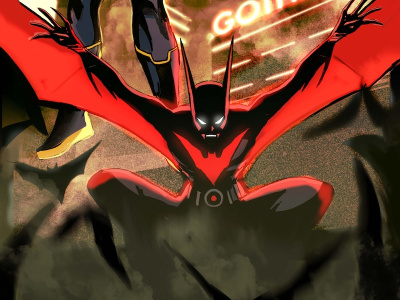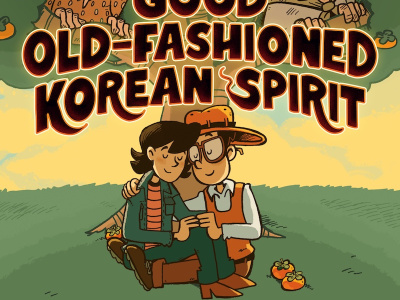In Business 3x3, a business retailer or executive will share their experience with three things they’ve done right, three things they’ve done wrong, and what else they’ve learned along the way.
At the end of the day, Menachem Luchins wound up opening the store that he would have wanted as a customer. And it’s worked out pretty well for him.
Luchins had spent 10 years as a high school English teacher, and was feeling pretty burned out. He’d "always wanted to open a comic shop," but the idea was abstract, kind of a back-of-the-brain thing, until another comic store went up for sale.
Luchins brought the abstract into the practical, kicking the tires and crunching numbers with an accountant friend of his. His ultimate decision was not to put in a bid on the existing store, but rather to open his own, starting from scratch. Luchins went the Kickstarter route, offering up a comic shop/educational center hybrid.
"The Kickstarter failed, but got a lot of attention," he says. "Then, I was able to sell a few of the things that I had collected for the Kickstarter, as well as some collections that had been passed on to me when people heard about me opening the store. We just sort of went into it from there."
"From there" is Escape Pod Comics in Huntington, NY. The store opened its doors in February, 2013 and Luchins has learned a lot in the intervening five years.
THE GOOD
Play to the Kids!
Luchins is especially proud of his efforts in what has become a huge growth area for everyone.
"Most stores added a kids and young adults section; we were able to start with one," he says. "It’s a small room in comparison to the rest of the store, but we have an incredibly wide selection. We have signs all over pointing to the kids section when you first walk in so that people are aware of it."
Luchins calls his kids/YA customers, "...steady, but non‑regular customers, which is exactly what a retail business should want. It's not someone coming in just for the next Raina Telgemeier. It's someone coming in to get three or four books for them or their kids to just read."
Luchins feels this puts the most "book" in the comic book store business.
"If they’ve read all the Amulet, they catch up on The Baby‑Sitters Club books. There's always something else for them to buy. That's a real market unlike the single-issue corporate superhero market."
Downplay the Collector Market
Oh, yeah—the single-issue superhero market. Luchins says he actively downplays collectability and single issues overall.
"The real trick to it is to actually downplay it not just in space, but in reaction and discussion and hype," he says. "We do not hype up that there's some big number one coming out. Because guess what? The people looking for this stuff already know about this stuff."
Luchins admits he’ll follow his customers’ lead.
"I will spend hours on a Wednesday discussing some announcement of a new #1," he says. "But unless it's by a creator I know who has a track record—and that could be at Marvel or DC or Image or Dark Horse—we are not just putting up a poster for it because people are going to come looking for it."
Luchins thinks that in a world where top-selling monthly books hit 100,000 to 200,000 sales, he’s better focusing on books and creators.
"We're talking about maybe 60,000 readers," he says. "Those are the numbers. If you really look at it, you have 60,000 people who go out and buy comic books weekly. That's not a sustainable market for Marvel and DC to be pumping out over 50 books a month."
Do Dollar Books, in a Different Way
The opposite of the collector market is the cheap market... which Luchins loves.
"When I was doing the Kickstarter, I was contacted by J.M. DeMatteis, and he was getting rid of all his comps from 30 years of working at Marvel and DC," he says. "He was just going to take them to the dump unless someone wanted to pick them up, so I did. I was thinking I would make some sets and sell them when the store opened."
Luchins doubled his bonanza when his brother moved cross-country and wanted to get rid of all his old comics as well.
"So I looked through his books and DeMatteis’ books and most of them…were just fun reads, just great comics," he says. "Little monetary value, but great reader value. It wasn’t to generate great money anyway, so I started the store with something that wasn’t in my original business plan, about 30 boxes of dollar books."
Luchins says he hits both ends of a spectrum.
"Dollar stuff attracts a huge range of people. We get kids who just saw Flash or Arrow on TV and now want to try a comic—and they don’t even have to spend their parents’ money; they can spend a dollar of their own and grab a cool, old comic. And I had a bunch of guys, old-school collectors who barely look at anything new, and they spent two hours here this morning! Just digging around a looking for stuff is fun for them, and they’ll spend a few bucks."
Escape Pod also does dollar trade-ins: Two of your used for one of the store’s.
"In five years, we have generated a great amount of movement and sales through that," Luchins says "We’re now up to about 50 boxes from the original 30."
THE BAD
Get Some Experience!
Luchins chased a dream, but being an English teacher is hardly prep for running a comic store.
"I'm good with customer service. Before I taught, I was a waiter. I actually managed a waitstaff," he says. "I can do that. But one thing I wish I had done was get some actual comic retail experience on the floor."
Luchins had to get up to speed fast on ordering, paperwork, and the sticky wicket of what to do with variant ordering.
"I should have reached out to stores in New York to discuss their practices. I should have seen if there was any sort of part‑time work I could do to have prepared me," he says, "because that was a steep learning curve within the first six months of being open. Just six months working somewhere on the floor, even behind the scenes, before I jumped into it would have been incredibly valuable experience."
Don’t Love It Too Much/Go Too Advanced with Customers
Talk to Luchins and you’ll hear him dripping love about the comics medium. That... can be a problem. He knows you sometimes have to "work customers up toward something."
"Take Cerebus," he says. "I'm a humongous Cerebus fan. I love it because of everything that it did for the medium. But I can’t recommend everyone read it. The amount of dedication involved in reading it—it's 300 issues, 16 books—is immense. More than that, half of it is a commentary on the comic market at a specific time in the past. It's not an easy read."
Luchins’ own tastes run to the art house side of things, but he knows that can be a trap.
"We don't discuss that we have cool, funky comics," he says. "We discuss the breadth of the comics medium because we have tons of stuff that's also in no way art house or fancy. We have lots of just great, fun comics that you can read without ever picking up a comic before."
Luchins is proud of his selection, which he calls "wider certainly than anyone else on Long Island."
"We have the Will Eisner Spirit newspaper that you could only get at the Lakes International Comic Art Festival, and we also have Batman #44. Actually, I just sold out of Batman #44."
Find the Way with 'The Single Issue People'
A certain part of how Luchins runs his store has to do with proximity and history.
"When we opened, there was a super-old school shop maybe two miles from us that carried almost no graphic novels, just sold superhero books," he says. "I loved that they were there, because I really didn’t have to deal with single issues as much. I could just say, ‘Go down the block.’"
That store eventually closed, and some customers spilled into Escape Pod. Luchins is still looking for the best way to serve them.
"As much as those people are not the market force that the young readers are or the people who are attached to trades are, there is still a really interesting force of comics-buying people who come in every five or six months who want every single issue of certain things," he says. "And we’re really not equipped to handle them. Once something’s more than a year old here, it goes in the dollar bin. We’re not set up for someone to come in and say, ‘I need the last six Action.’ We’re not there now, and I wish we would have taken that into better consideration from the start."
AND WHAT ELSE?
"I made a couple of guesses about where I saw the market was going when I opened the store. That kids/young adult dedicated space was a good guess, and has been crucial for us. Having people know that they can come here and they and their kids can find out about books that they didn't even know existed is great. And they’re not being pushed on, ‘Oh, come back next month and get the next issue’ makes it a casual shopping experience. I think that’s really where the whole market's been going as well."
"I'm not going to say we don't get variant covers. We do. If we qualify for them or if we believe that the artist has something that people would really want, we'll get them. We price them a little higher if we have to order more to get them. But we don't make a big stink about it.
"There's a little display area of variants on top of the new books for the week. If I sell out of the regular cover as I did with Amazing Spider-Man this [April 4, 2018] week, the Terry Dodson variant, which is the one I have the most of because I love Dodson, becomes regular priced because I have the book to sell.
"I'm not against the concept of variants. But I'm against a belief that the single issue market is a market worth looking at."
"I had a customer come in and ask where they could get Civil War and all the Civil War tie-ins. I told him I could sell him 4-5 volumes, or he could get a trial on Marvel Unlimited. We live in a world where almost everything can be digital and instant, and most people don’t want to wait and pay and extra $6 for special order shipping. I told him to try Unlimited, and if he liked it, I could turn him on to all sorts of other stuff, Marvel and not, that I’d think he’d like. And I can order that for him. I do this all the time. If I don’t have a trade in stock, I often don’t say, ‘Hey, I can rush-order it for the end of the week for you and make you pay an extra six bucks.’ I tell them to get it on Amazon. We call that our Miracle on 34th St. Policy, because they’ll come back to us, back to us first, because we were confident enough to tell them where else they could get it elsewhere."
"I think the most important thing for a comic store to do, after having a voice, is to diversify within comics. I walk into a store, and they’re covered with Pops, and there’s shelves and shelves of action figures, and that’s wonderful for a bottom line, I understand why it’s being done, but... that’s a market that’s online. In 99% of the cases, it’s better online. I think a comic shop should primarily sell comics. When retailers say, ‘I don’t have enough comics to sell to make ends meet, or enough good comics,' ...I can’t talk to those guys. Even if you just take the top five publishers, they’re all putting out more than they ever have before. And then there’s every publisher in addition to those!"
Click Gallery below for set of full-size pics!
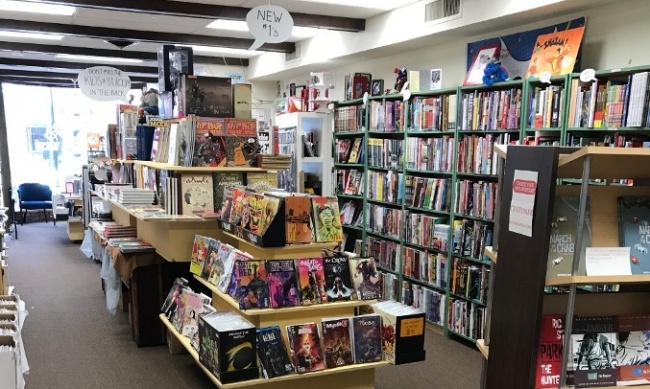
'Downplay the Collector Market' (with Lots of Pics!)
Posted by Jim McLauchlin on April 13, 2018 @ 6:12 am CT
MORE COMICS
Pairing Neo-Gotham's Batman with Dakota City's Static
August 13, 2025
The series teams up Terry McGinnis, the Batman of Neo-Gotham, and Virgil Hawkins, Milestone’s Static.
New Graphic Novel by Creators of 'Banned Book Club'
August 13, 2025
Kim Hyun Sook and Ryan Estrada, creators of the Eisner-nominated Banned Book Club, are back with a lighter take on rebellious teens, meddling elders, and Korean traditions.
MORE COLUMNS
Column by Scott Thorne
August 11, 2025
This week, columnist Scott Thorne notes a new twist in the Diamond Comic Distributors saga and shares his thoughts on the Gen Con releases that will make the biggest impacts.
Column by Jeffrey Dohm-Sanchez
August 7, 2025
ICv2 Managing Editor Jeffrey Dohm-Sanchez lays out the hotness of Gen Con 2025.




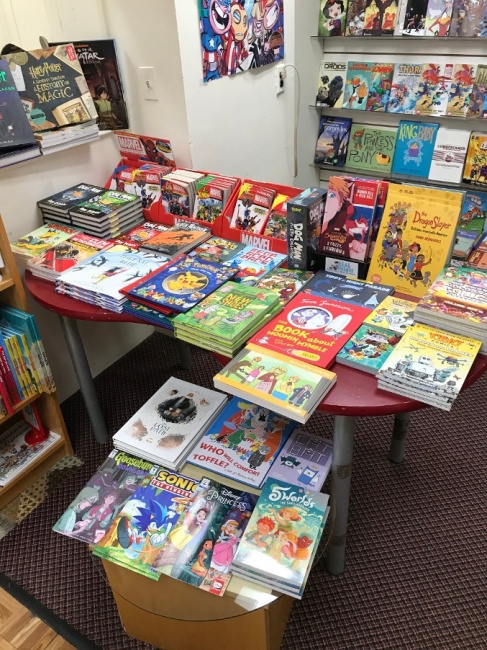
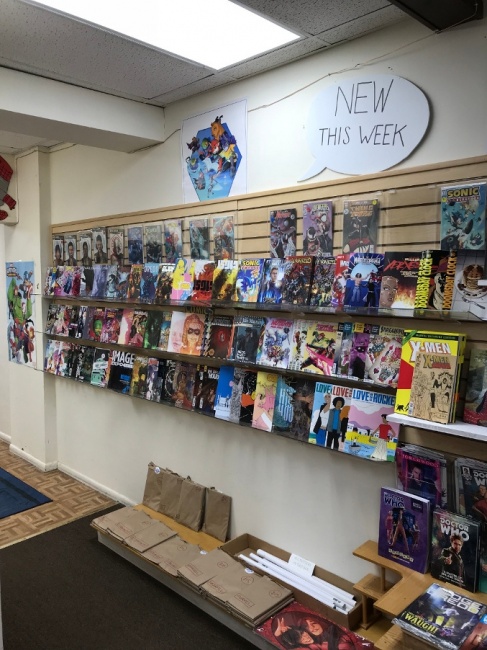
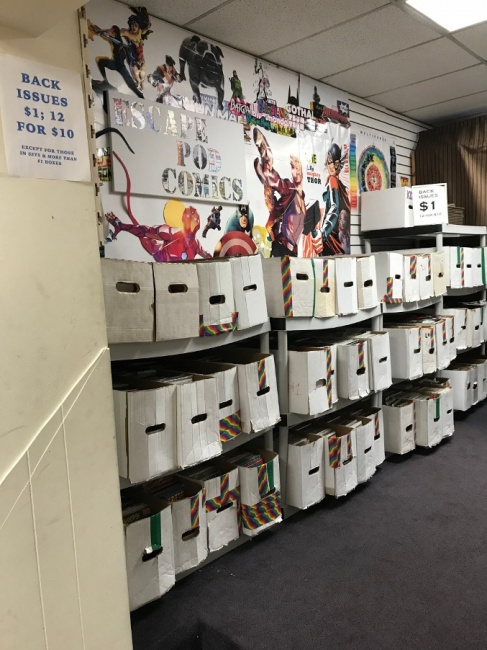
 View Gallery: 15 Images
View Gallery: 15 Images 